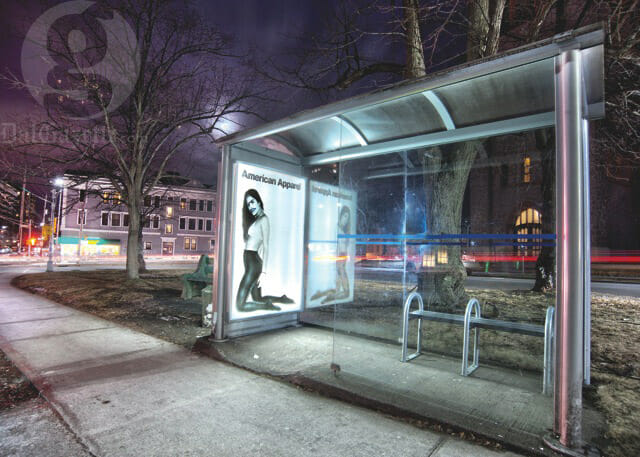
If you’re a student who relies on public transportation to get where you’re going, chances are you’ve seen the ads for American Apparel at bus stops around campus. The ads are pretty standard for American Apparel: young women posing suggestively, wearing leggings and not much else.
It’s a cliché to say that sex sells, and I’m not going to single out American Apparel for using the same marketing strategy as every other “fashion-forward” clothing retailer. And that’s not to say that there aren’t legitimate arguments to be made about how women are objectified and degraded by this kind of advertising. But what bothers me about American Apparel in particular is what goes on outside of its marketing department.
Before I go further, I should probably give you the Coles Notes version of American Apparel’s corporate history. The man behind the company is its founder and CEO, Dov Charney. Charney, Montreal born and bred, got started in the clothing business while he was still in high school by importing T-shirts from the US and selling them to his friends. He eventually moved into manufacturing and relocated to California in 1997, building a factory in downtown Los Angeles.
Over the next decade, Charney turned American Apparel into a global brand, opening over 250 stores in 19 countries, and winning accolades like “Man of the Year” from the Fashion Industry Guild along the way.
You can’t talk about American Apparel without bringing up Charney. He’s the personification of the company’s brand, a maverick businessman and a libertine all in one wiry, bespectacled, ironically moustached 43-year-old package.
At a time when most clothing is made in faraway sweatshops, American Apparel pays its workers double the minimum wage, and provides benefits such as health insurance and free English lessons to Latino workers. Although Charney claims that his decision not to outsource his manufacturing is motivated by self-interest and the need to respond quickly to emerging fashion trends, American Apparel nonetheless supports social causes such as gay rights and immigration reform.
What really sets American Apparel apart—and what is most troubling—is Charney’s enthusiastic embrace of his sexuality. For most American CEOs, sex on the job is grounds for dismissal. That’s not the case for Charney, who is known for walking around his office in his underwear and personally overseeing (and appearing in) the racy photo shoots featuring his employees as models. Charney is also open to having sexual relationships with his subordinates, as illustrated by his willingness to engage in oral sex with a female staffer in the presence of a reporter who was profiling him for Jane magazine.
While Charney has defended his relationships in the media as being loving and consensual, I can’t help but feel that the power dynamics that exist between managers and their staff raises some serious questions about coercion and harassment. Charney has, in fact, faced sexual harassment lawsuits from a number of former female employees, although these have either been settled outside of court or dismissed.
More recently, several of the same former employees have launched new lawsuits against Charney and American Apparel, accusing them of leaking nude pictures and conducting a smear campaign on the Internet.
Regardless of whether there is any truth to the allegations against Charney, it’s not hard to see how having a CEO who sleeps with his underlings and refers to female workers as “sluts” might set a bad example for the rest of the company. That’s why I wasn’t surprised to read that the U.S. Equal Employment Opportunity Commission ruled in 2010 that American Apparel discriminated against all women in the workplace by subjecting them to sexual harassment.
I realize that American Apparel relies on the controversy generated by its “edgy” advertising campaigns and by Charney’s behaviour to get the publicity it needs to differentiate itself from other clothing retailers. As Ilse Metchek, the president of the California Fashion Association and friend of Charney, said in The New York Times, “What is American Apparel without sex? It’s a T-shirt and sweatshirt company.”
Maybe that’s my problem—I want American Apparel just to be a T-shirt and sweatshirt company. I really like some of what American Apparel sells, and if you happen to see me on the street, chances are I’ll be wearing one of their hoodies. But whenever I find myself at the cash register of the store on Queen Street, I wish I could forget about everything I’ve heard about the company and its CEO. I don’t want to buy into a lifestyle or brand or whatever; I just want something to wear without feeling like I’m condoning sexual harassment.







